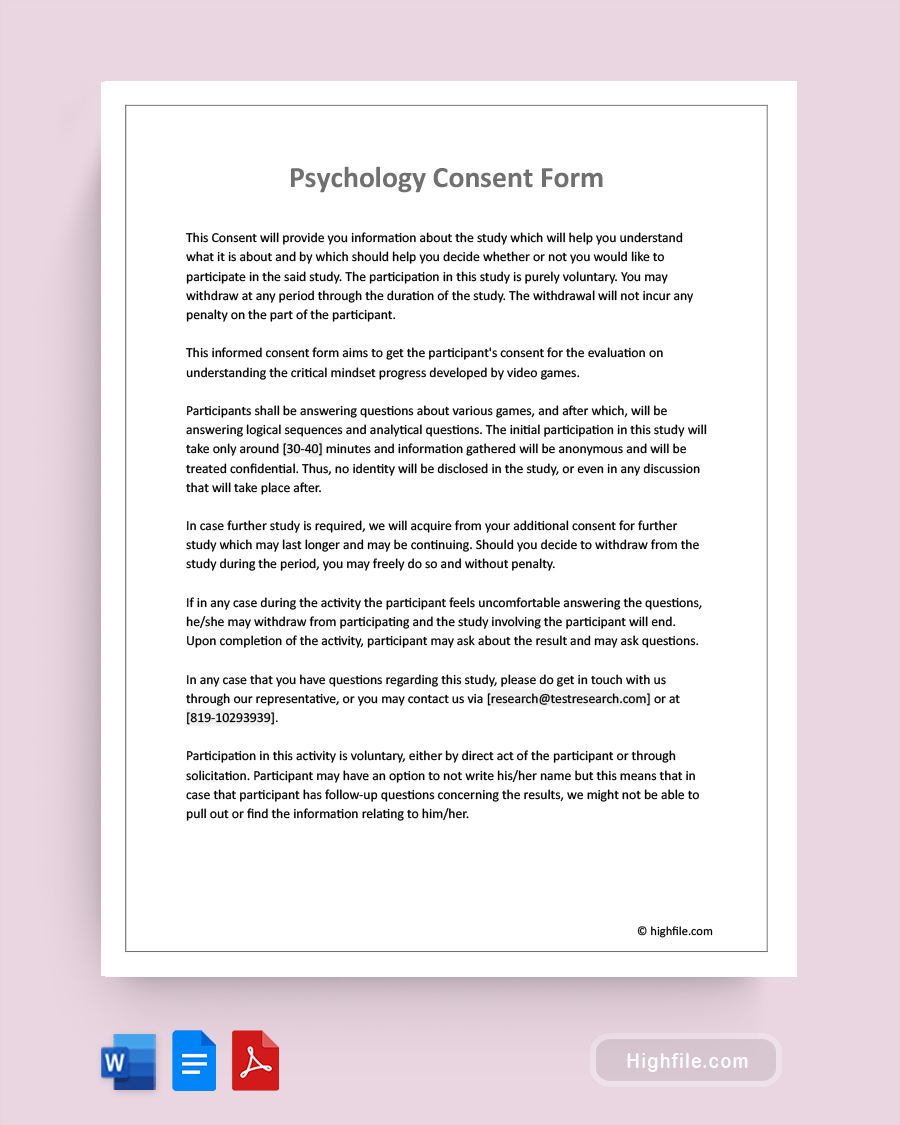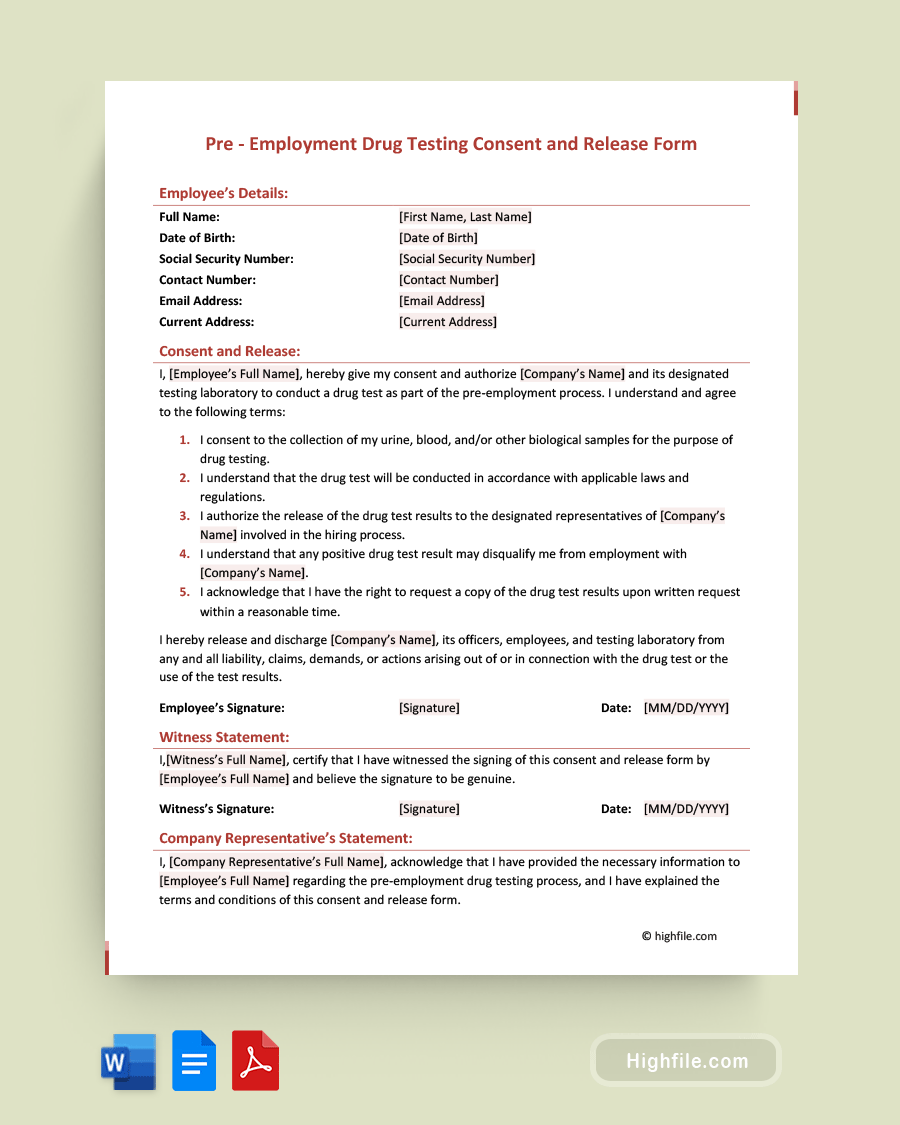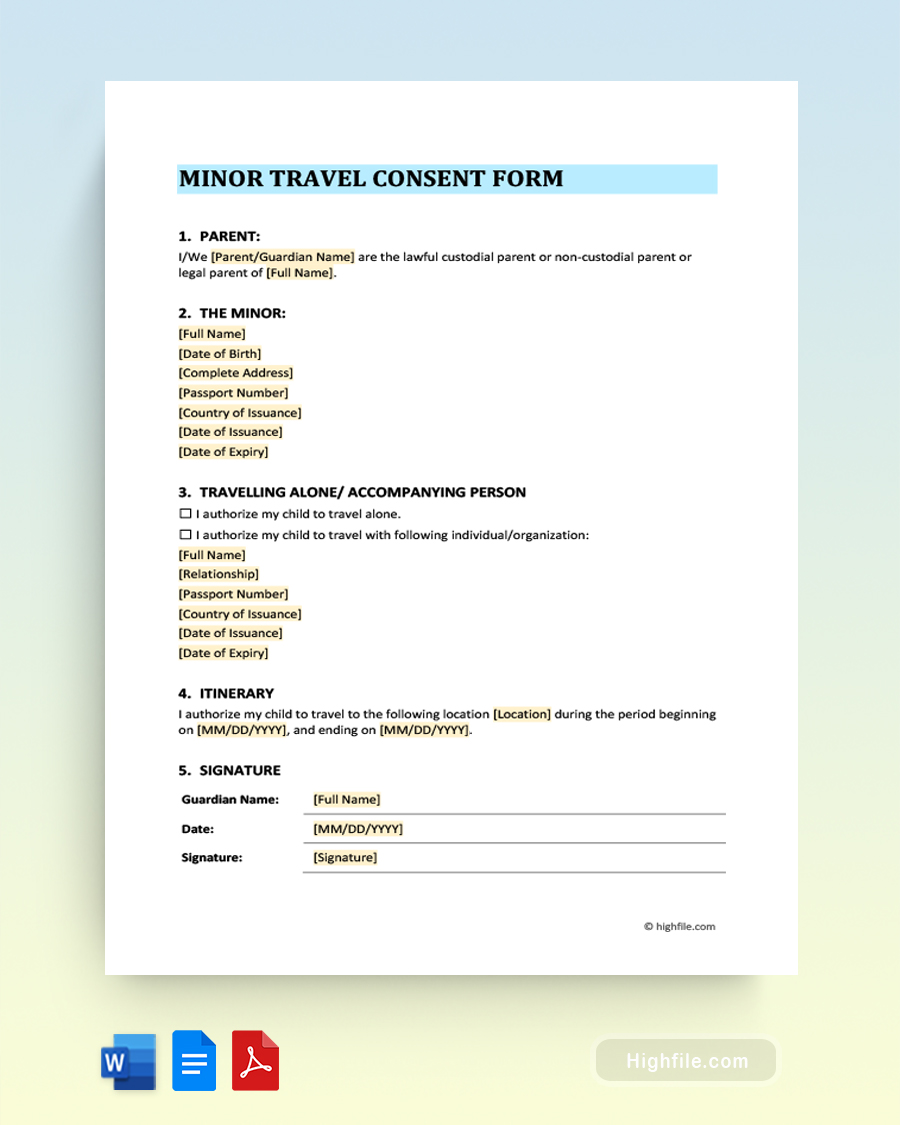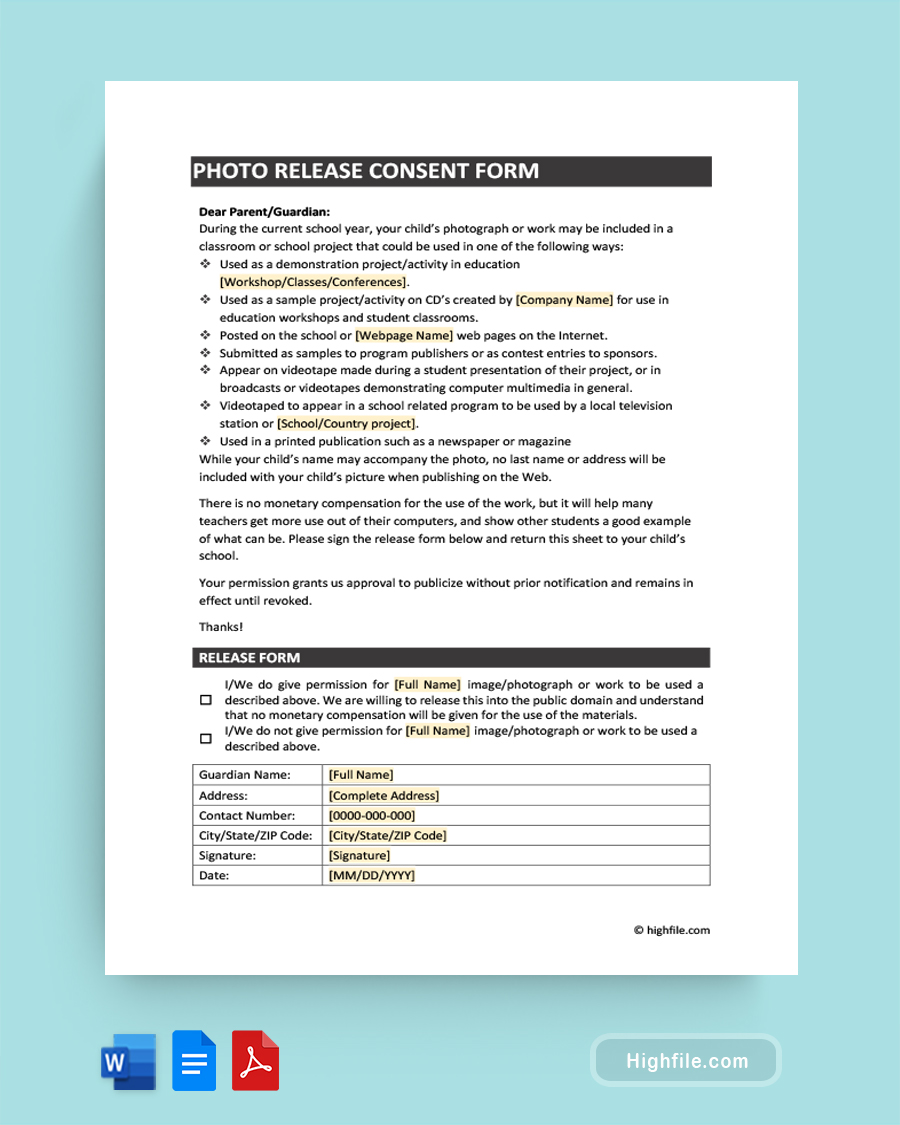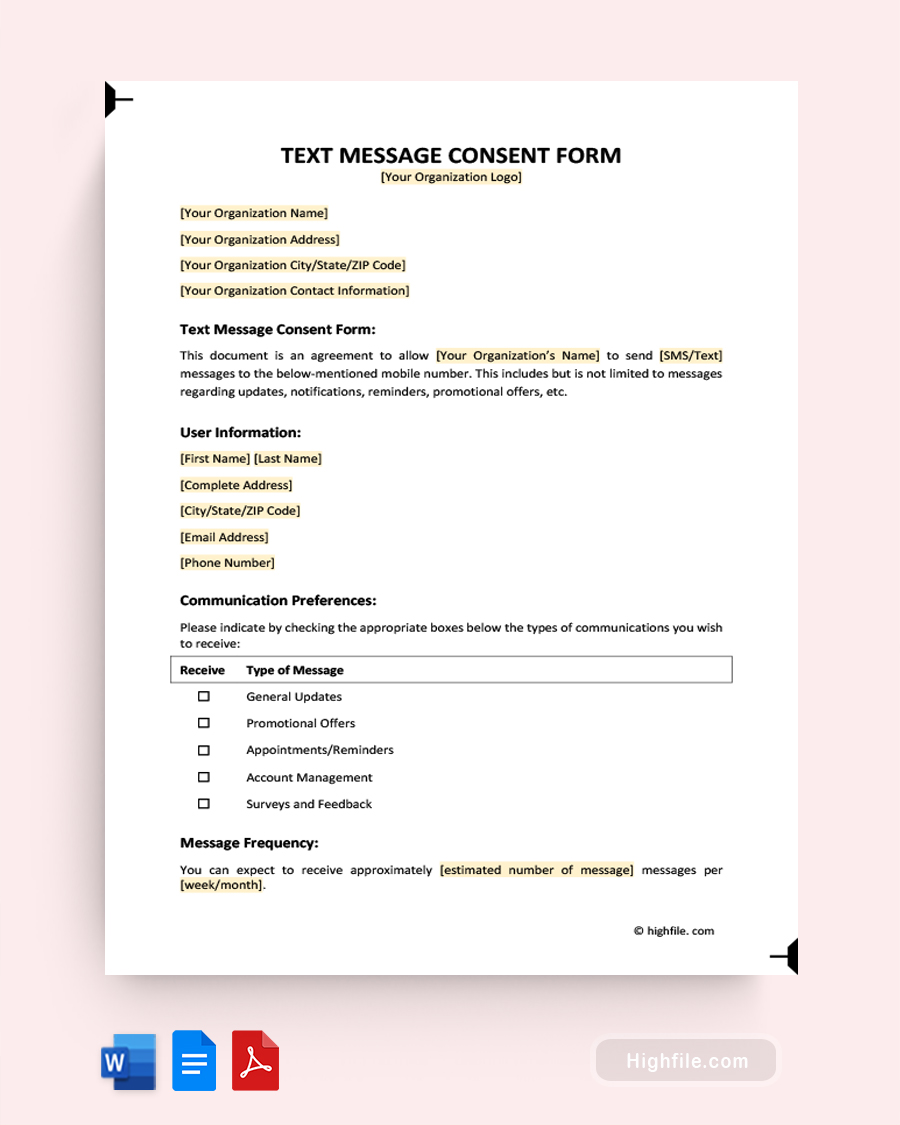A psychology consent form is vital to any research involving human subjects. It is a document that outlines the purpose of the study, the procedures that will be conducted, and the rights of the participants. It also informs the participant of any risks associated with the research and documents their informed consent to participate. The form should be signed by both the researcher and the participant prior to starting the research. Psychology consent forms are essential for protecting both the researcher and the participant. It serves as a written record of what was agreed upon between the two parties and provides assurance that the research was conducted in an ethical manner. Use a professionally designed psychology consent form template to help ensure you give and collect all the pertinent data and permissions.
What Is a Psychology Consent Form?
A psychology consent form is a document that outlines the information about a research project that a participant needs to know to make an informed decision about whether or not to participate. It includes details such as the purpose of the research, the data that will be collected, the risks and benefits of participation, the right to withdraw at any time, and contact information for the researcher. This form is an essential tool for protecting the rights of participants and ensuring they are aware of any potential risks or consequences of participating in a research study.
Why Is Psychology Consent Form Important?
A psychology consent form is important to ensure participants understand the risks and benefits of therapy or research and know their rights. By signing the document, the client confirms that they understand the information given to them and are giving informed consent to participate. A consent form also acts as a legal document that can be used in a court of law. It also serves as a written record of the client’s agreement to participate in therapy. This document should be updated regularly as the therapy progresses to accurately reflect any changes in the treatment plan or any new information discussed between the therapist and the client.
It is crucial to have a formal agreement between the therapist or researcher and the client about what will happen during therapy or medical research. This agreement may also be signed before a witness and made publically available for review by any party involved. Depending on how many people are involved, it may also be helpful to include an independent third-party conduct or ethics committee to oversee the treatment process and provide oversight if necessary.
Interesting Fact: Informed consent was not widely considered an ethical requirement for research or therapy until the 20th century. Although these forms are now standard practice, many examples exist of studies and treatments performed throughout history that violate modern ethical conduct standards. For example, the Landis’ Facial Expressions Experiment of 1924 led directly to the creation of review boards due to the trauma it produced in the subjects and the animals they interacted with.
Required Elements of a Psychology Consent Form Template
Psychology consent form templates are essential to help medical professionals and researchers create documents that protect the rights of the patients or subjects and the psychologists or researchers. They lay out the expectations and parameters, clearly defining what is and is not allowed. Psychology consent forms also provide patients with important information about their rights, confidentiality laws, and any potential risks involved in the therapy. By signing a psychology consent form, patients acknowledge that they understand these details and agree to follow them. We’ve provided an overview of the required elements below.
- Form Title- The form title should say “Psychology Consent Form.”
- Document Overview- This section explains the consent form and the participant’s right to participate or refuse.
- Intent- The intent statement briefly explains why the study needs informed consent and what is being studied.
- Description of Study- A longer statement about what the study entails goes here.
- Possibility of Additional Study and Consent- Explain if further research is likely and that it would require additional consent.
- Right to Withdraw- This explains the right to withdraw at any time without penalty.
- Contact Information for Study- Include the contact information in case participants have questions.
- Voluntary Participation Statement- This explains the voluntary nature and options for anonymity.
- Consent With Age Indication- User checkboxes to indicate whether the participant is under or over 18 and that they consent to participate.
- Name- List the participant’s full name here.
- Signature and Date Lines- By signing and dating this form, the participant creates a voluntary contract to participate in the study.
FAQs
We’ve answered the most frequently asked questions below to help you create better psychology consent forms from our template and facilitate the conversation with potential patients or study subjects. Here you’ll learn more about the risks and benefits of signing these forms, confidentiality, withdrawing consent, who gets a copy, and much more.
Participating in psychology research without signing a consent form is illegal since researchers are required to collect informed consent. Consent forms are a vital part of any research project and are required by most research institutions. These forms provide an opportunity for participants to understand the purpose of the research, what their role will be, and any risks that may be associated with participation. By signing a consent form, participants agree to participate in the research and grant permission to the researchers to use the data they provide. Therefore, it is only possible to participate in psychology research by signing a consent form.
If you change your mind after signing a consent form, you can withdraw your consent anytime. Depending on the type of consent form, you may need to provide a signed statement indicating that you are revoking your consent. In other cases, verbal notification may be sufficient. In any case, it is crucial to keep a record of your withdrawal of consent. Additionally, if the consent form was part of a contract, you may need to provide additional information or documentation to withdraw your consent.
When signing a psychology consent form, your personal information will be protected and kept confidential per the laws and regulations of the state where the research is conducted and federal standards. This includes the Health Insurance Portability and Accountability Act (HIPAA) and the Family Educational Rights and Privacy Act (FERPA).
The consent form may include a statement that outlines how your personal information will be used, stored, and protected. This statement will typically include information about who will have access to your personal information, how it will be used, and how it will be kept secure. It may also include details about who to contact in the event of a security breach or data loss. A consent form must contain certain information if it is required by law. In addition, if you are minor in the United States, you must have your parents sign this agreement.
Psychology research is essential for many reasons. For example, it’s used to improve treatments, develop new therapies, and test new drugs. However, like most research, there are positives and negatives. Here are the benefits and risks of participation:
Benefits of Participating in Psychology Research
Participating in psychology research can benefit both the researcher and the participant.
ᐅ Understanding: For the researcher, it can provide valuable data that can be used to further their understanding of a particular topic or phenomenon.
ᐅ Self-Awareness and Improved Treatments: For the participant, it can provide an opportunity to learn more about themselves and their behavior and potentially help others by providing data that can be used to help improve psychological treatments and interventions.
ᐅ Satisfaction: Participating in psychology research can provide a sense of satisfaction, accomplishment, and a feeling of being part of something bigger than oneself.
ᐅ Compensation: Many studies offer monetary compensation for participants, making it an attractive option for those short on cash.
Risks of Participating in Psychology Research
ᐅ Risk of Injury: Psychological research often involves activities that may put a person at risk of physical or psychological injury. For example, a study may require participants to engage in physically strenuous activities, or an experiment may require participants to discuss difficult or upsetting topics that could cause emotional distress.
ᐅ Risk of Privacy: Psychological research often requires the participant to provide personal information, such as contact information and medical history. This information could be used for purposes other than the original research, potentially leading to a breach of privacy.
ᐅ Risk of Harm to Research Participants: Psychological research often involves using harmful or potentially harmful procedures, such as exposure to mind-altering drugs or physical pain. For example, a participant may be required to participate in an experiment involving drug exposure.
ᐅ Risk of Harm to Others: Psychological research often requires participants to participate in activities that could impact others, such as participating in a study where participants are encouraged to think about their loved ones while receiving electrical shocks. Participating in psychological research poses some risks for the participant, but the possible benefits outweigh those risks.
You can refuse to participate in certain parts of a research study. However, it is essential to remember that if you do not participate in certain parts of the study, it may affect the validity and reliability of the data collected. It is, therefore, important to discuss your concerns with the researcher before deciding to refuse participation. The researcher should also be able to provide information about the potential consequences of refusing to participate in certain parts of the study.
If you have any questions or concerns about the psychology consent form or research study, you should contact the researcher or the research team responsible for conducting the study. They will be able to answer any questions you have and address any concerns you may have. Additionally, you should contact your local ethics committee or a qualified legal professional if you have any ethical or legal concerns regarding the consent form or research study.
When you don’t sign the psychology consent form, it means you do not agree to participate in the psychology study. You will be unable to participate in the research and lose out on any potential benefits. Additionally, if the study is funded by a grant or is part of a larger research project, you must sign the consent form to ensure all your data can be used.
You will receive a copy of the consent form after signing. This standard document is given to anyone signing a consent form; it will include all of the information discussed before signing, such as any risks associated with the study, a detailed explanation of the study’s purpose, and any other pertinent information. Most organizations provide electronic or physical copies, but some make the form available online. Having a copy of the consent form for your records ensures that you know everything agreed upon and serves as evidence of your consent.
Final Thoughts
Psychology consent forms also provide an opportunity for patients to discuss any questions they may have with the psychologist before beginning therapy or participating in a study. This is important because it allows the patient to ask clarifying questions or express difficulties they may be experiencing. Psychology consent forms also exist to respect patient rights and help protect doctors and researchers against litigation. Choosing a high-quality psychology consent form template allows you to quickly and easily create a suitable legal document for your practice or study.
